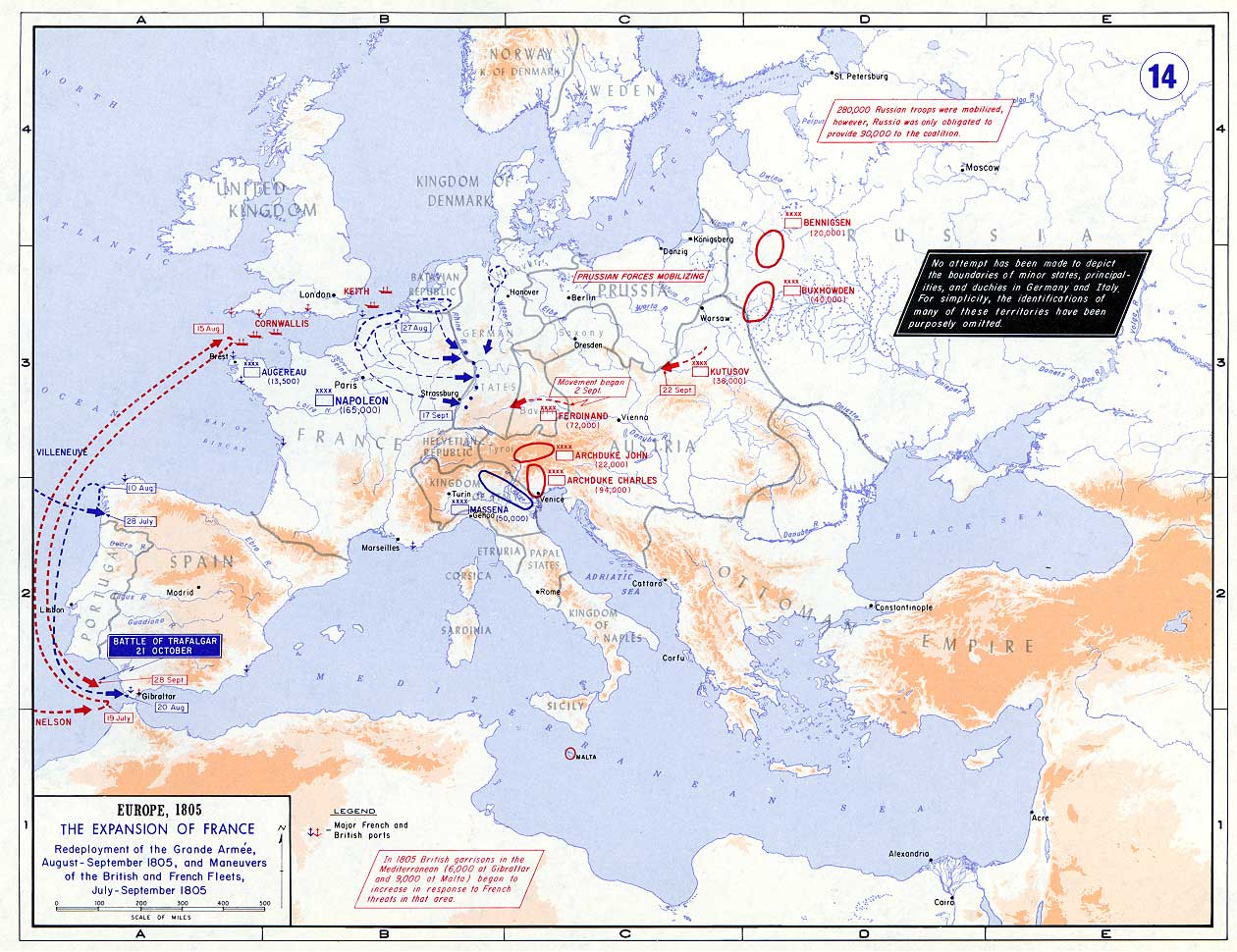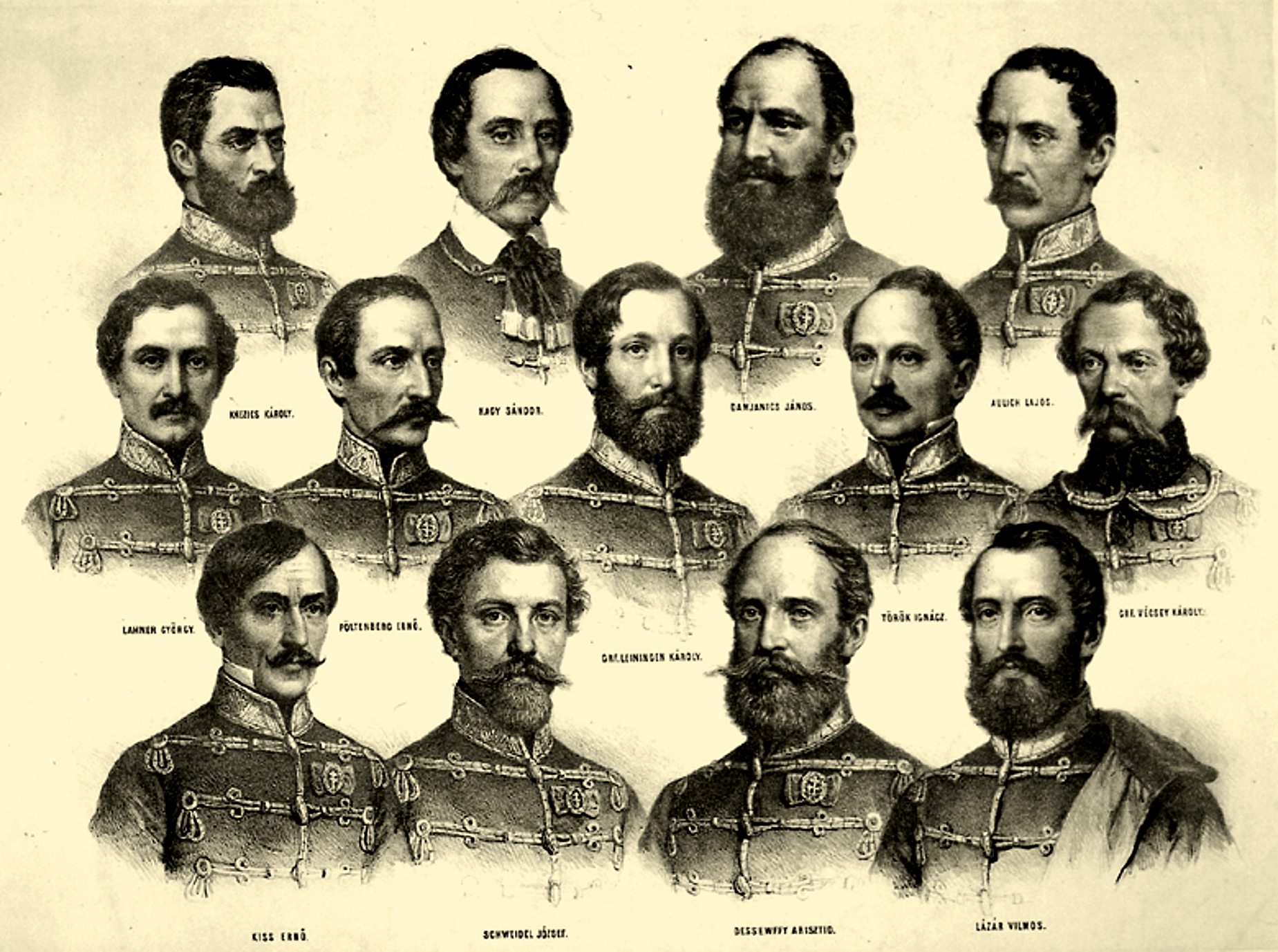|
August Von Vécsey
August, Graf von Vécsey or August Vécsey de Hernádvécse et Hajnácskeő (; 22 August 1775 – 15 January 1857) was an Imperial Austrian general of Hungarian descent who fought in the French Revolutionary Wars and Napoleonic Wars. He won a notable award in 1806 and became a general officer in 1809. That year, he commanded a brigade at Wagram during the War of the Fifth Coalition. His brigade was defeated by superior numbers at Feistritz in September 1813. He led his troops during the subsequent Italian campaign in 1813 and 1814. He was promoted to higher rank in 1820 and 1840. Family August Vécsey de Hernádvécse et Hajnácskeő was born of parents Oberst (colonel) Siegbert Vécsey de Hernádvécse et Hajnácskeő (1739–1802) and Sophie von Révay (1743–1791) on 22 August 1775 in Leshniv in the Austrian province of Galicia. Leshniv is now located in Ukraine.Smith & Kudrna (2008), ''August de Vécsey'' His father was promoted to Feldmarschall-Leutnant in 1790.Smith & ... [...More Info...] [...Related Items...] OR: [Wikipedia] [Google] [Baidu] |
Leshniv
Leshniv (; ; ; ; ) is a village (''selo'') in Zolochiv Raion, Lviv Oblast, in western Ukraine. It belongs to Brody urban hromada, one of the hromadas of Ukraine. From 1918 to 1939 the village was in Tarnopol Voivodeship in Poland. It was established in 1471. In 1921 the village had 1472 inhabitants. It has two cemeteries, a church and a cafe. It's around 20 kilometers from Brody. Until 18 July 2020, Leshniv belonged to Brody Raion Brody Raion () was a raion (district) of Lviv Oblast in western Ukraine. Its administrative center was Brody. The raion was abolished on 18 July 2020 as part of an administrative reform in Ukraine, which reduced the number of raions of Lviv Obla .... The raion was abolished in July 2020 as part of the administrative reform of Ukraine, which reduced the number of raions of Lviv Oblast to seven. The area of Brody Raion was merged into Zolochiv Raion. References Villages in Zolochiv Raion, Lviv Oblast {{Lviv-geo-stub ... [...More Info...] [...Related Items...] OR: [Wikipedia] [Google] [Baidu] |
Oberst
''Oberst'' () is a senior field officer rank in several German language, German-speaking and Scandinavian countries, equivalent to Colonel. It is currently used by both the Army, ground and air forces of Austria, Germany, Switzerland, Denmark, and Norway. The Sweden, Swedish rank ''överste'' is a direct translation, as are the Finland, Finnish rank ''eversti'' and the Icelandic rank ''ofursti''. History and origins is a German word. Spelled with a capital O, "" is a noun and defines the military rank of colonel or group captain. Spelled with a lower case o, or "", it is an adjective, meaning "superior, top, topmost, uppermost, highest, chief, head, first, principal, or supreme". Both usages derive from the superlative of , "the upper" or "the uppermost". As a family name, ''Oberst'' is common in the southwest of Germany, in the area known as the Black Forest (''Schwarzwald''). The name is also concentrated in the north-central cantons of Switzerland (Aargau & Canton of Zürich ... [...More Info...] [...Related Items...] OR: [Wikipedia] [Google] [Baidu] |
1857 Deaths
Events January–March * January 1 – The biggest Estonian newspaper, '' Postimees'', is established by Johann Voldemar Jannsen. * January 7 – The partly French-owned London General Omnibus Company begins operating. * January 9 – The 7.9 Fort Tejon earthquake shakes Central and Southern California, with a maximum Mercalli intensity of IX (''Violent''). * January 24 – The University of Calcutta is established in Calcutta, as the first multidisciplinary modern university in South Asia. The University of Bombay is also established in Bombay, British India, this year. * February 3 – The National Deaf Mute College (later renamed Gallaudet University) is established in Washington, D.C., becoming the first school for the advanced education of the deaf. * February 5 – The Federal Constitution of the United Mexican States is promulgated. * March – The Austrian garrison leaves Bucharest. * March 3 ** France and the United Kingdom f ... [...More Info...] [...Related Items...] OR: [Wikipedia] [Google] [Baidu] |
1775 Births
Events Summary The American Revolutionary War began this year, with the first military engagement on April 19 Battles of Lexington and Concord on the day after Paul Revere's ride. The Second Continental Congress took various steps toward organizing an American government, appointing George Washington commander-in-chief (June 14), Benjamin Franklin postmaster general (July 26) and creating a Continental Navy (October 13) and a Marine force (November 10) as landing troops for it, but as yet the 13 colonies have not declared independence, and both the British (June 12) and American (July 15) governments make laws. On July 6, Congress issues the Declaration of the Causes and Necessity of Taking Up Arms and on August 23, King George III of Great Britain declares the American colonies in rebellion, announcing it to Parliament on November 10. On June 17, two months into the colonial siege of Boston, at the Battle of Bunker Hill, just north of Boston, British forces are vic ... [...More Info...] [...Related Items...] OR: [Wikipedia] [Google] [Baidu] |
Grenz Infantry
Grenz infantry or Grenzers or Granichary (from " border guard" or "frontiersman"; Serbo-Croatian: graničari, krajišnici, Hungarian: granicsár, sr-cyr, граничари, крајишници, Russian Cyrillic: граничары) were combined border guard troops (include light cavalry, light horse artillery, light infantry, and line infantry) who came from the Military Frontier in the Habsburg monarchy (later the Austrian Empire and Austria-Hungary). This borderland formed a buffer zone between Christian Europe and the Ottoman Empire, and the troops were originally raised to defend their homelands against the Ottoman Turks. When there was no danger of war against the Ottomans, the Grenzer regiments were employed by the Habsburgs in other theatres of war, although one battalion of each regiment would always remain guarding the border. As Granichary, members of this Grenz infantry were invited to the Russian Empire where on territory of modern Ukraine they formed historic ... [...More Info...] [...Related Items...] OR: [Wikipedia] [Google] [Baidu] |
Johann Von Klenau
Johann Josef Cajetan Graf von Klenau, Freiherr von Janowitz (; 13 April 1758 – 6 October 1819) was a field marshal in the Hapsburg Monarchy, Habsburg army. Klenau, the son of a Bohemian nobility, Bohemian noble, joined the House of Habsburg, Habsburg military as a teenager and fought in the War of Bavarian Succession against Kingdom of Prussia, Prussia, Austria's Austro–Turkish War (1787–1791), wars with the Ottoman Empire, the French Revolutionary Wars, and the Napoleonic Wars, in which he commanded a corps in several important battles. In the early years of the French Revolutionary Wars, Klenau distinguished himself at the First Battle of Wissembourg (1793), Wissembourg lines, and led a battle-winning charge at Heidelberg#City districts, Handschuhsheim in 1795. As commander of the War of the Second Coalition, Coalition's left flank in the Adige campaign in northern Italy in 1799, he was instrumental in isolating the French-held fortresses on the Po River by organizin ... [...More Info...] [...Related Items...] OR: [Wikipedia] [Google] [Baidu] |
Karl Von Vincent
Karl Freiherr von Vincent (11 August 1757 – 7 October 1834) fought in the army of Habsburg Austria during the French Revolutionary Wars. He first served as a staff officer then later as a combat commander. During the Napoleonic Wars, he was given important commands in two campaigns. He was Proprietor (Inhaber) of a famous light cavalry regiment from 1806 until his death. For his actions in putting down the Brabant Revolution of 1789 and 1790, he earned an important award. In the War of the First Coalition he was Aide-de-camp to two distinguished generals. During the War of the Second Coalition, he commanded a regiment, then a brigade. He led the rear guard during the 1805 campaign. He commanded a division through all the major battles of 1809. He was governor-general of Belgium in 1814, and was present at the Battle of Waterloo as an Austrian observer. Between 1814 and 1826, von Vincent was the Austrian ambassador to France at the Tuileries The Tuileries Palace (, ) ... [...More Info...] [...Related Items...] OR: [Wikipedia] [Google] [Baidu] |
War Of The Third Coalition
The War of the Third Coalition () was a European conflict lasting from 1805 to 1806 and was the first conflict of the Napoleonic Wars. During the war, First French Empire, France and French client republic, its client states under Napoleon I and its ally Spain opposed an alliance, the Third Coalition, which was made up of the United Kingdom of Great Britain and Ireland, United Kingdom, the Austrian Empire, the Russian Empire, Kingdom of Naples, Naples, Kingdom of Sicily, Sicily, and Sweden. Kingdom of Prussia, Prussia remained neutral during the war. Britain had already been at war with France following the breakdown of the Treaty of Amiens, Peace of Amiens and remained the only country still at war with France after the Treaty of Pressburg (1805), Treaty of Pressburg. From 1803 to 1805, Britain stood under constant threat of a Napoleon's planned invasion of the United Kingdom, French invasion. The Royal Navy, however, assured its naval dominance at the Battle of Trafalgar in Oc ... [...More Info...] [...Related Items...] OR: [Wikipedia] [Google] [Baidu] |
Oberstleutnant
() (English: Lieutenant Colonel) is a senior field officer rank in several German-speaking and Scandinavian countries, equivalent to lieutenant colonel. It is currently used by both the ground and air forces of Austria, Germany, Switzerland, Denmark, Finland and Norway. The Swedish rank is a direct translation, as is the Finnish rank . Austria Austria's armed forces, the ''Bundesheer'', uses the rank Oberstleutnant as its sixth-highest officer rank. Like in Germany and Switzerland, Oberstleutnants are above Majors and below Obersts. The term also finds usage with the Austrian Bundespolizei (federal police force) and Justizwache (prison guards corps). These two organizations are civilian in nature, but their ranks are nonetheless structured in a military fashion. Belgium File:Army-BEL-OF-04.svg, Denmark The Danish rank of is based around the German term. Ranked OF-4 within NATO and having the paygrade of M401, it is used in the Royal Danish Army and the Ro ... [...More Info...] [...Related Items...] OR: [Wikipedia] [Google] [Baidu] |
War Of The Second Coalition
The War of the Second Coalition () (1798/9 – 1801/2, depending on periodisation) was the second war targeting French Revolution, revolutionary French First Republic, France by many European monarchies, led by Kingdom of Great Britain, Britain, Habsburg monarchy, Austria, and Russian Empire, Russia and including the Ottoman Empire, History of Portugal (1777–1834), Portugal, Kingdom of Naples, Naples and various German monarchies. Prussia did not join the coalition, while History of Spain (1700-1808), Spain supported France. The overall goal of Britain and Russia was to contain the expansion of the French Republic and to restore the monarchy in France, while Austriaweakened and in deep financial debt from the War of the First Coalitionsought primarily to recover its position and come out of the war stronger than when it had entered. The first half of the war saw the Coalition manage to drive the French back in Italy, Germany, and Holland, but they were not able to seriously t ... [...More Info...] [...Related Items...] OR: [Wikipedia] [Google] [Baidu] |
Major (rank)
Major is a senior military Officer (armed forces), officer military rank, rank used in many countries. When used unhyphenated and in conjunction with no other indicators, major is one rank above Captain (land), captain in armies and air forces, and one rank below lieutenant colonel. It is considered the most junior of the senior officer ranks. Background Etymologically, the word stems from the Latin word meaning "greater". The rank can be traced back to the rank of sergeant major general, which was shortened to sergeant major, and subsequently shortened to ''major''. When used in hyphenated or combined fashion, the term can also imply seniority at other levels of rank, including major general, denoting a low-level general officer, and sergeant major, denoting the most senior non-commissioned officer (NCO) of a military unit. The term major can also be used with a hyphen to denote the leader of a military band such as in Pipe-Major, pipe-major or drum-major. Links to major ... [...More Info...] [...Related Items...] OR: [Wikipedia] [Google] [Baidu] |
The 13 Martyrs Of Arad
The Thirteen Martyrs of Arad () were the thirteen Hungarian rebel generals who were executed by the Austrian Empire on 6 October 1849 in the city of Arad, then part of the Kingdom of Hungary (now in Romania), after the Hungarian Revolution (1848–1849). The execution was ordered by the Austrian general Julius Jacob von Haynau. Background In a historic speech on 3 March 1848, shortly after news of the revolution in Paris had arrived, Lajos Kossuth demanded parliamentary government for Hungary and constitutional government for the rest of Austria. The Revolution started on 15 March 1848, and after military setbacks in the winter and a successful campaign in the spring, Kossuth declared independence on 19 April 1849. By May 1849, the Hungarians controlled all of the country except Buda, which they won after a three-week bloody siege. The hopes of ultimate success, however, were frustrated by the intervention of Russia. After all appeals to other European states failed, ... [...More Info...] [...Related Items...] OR: [Wikipedia] [Google] [Baidu] |







